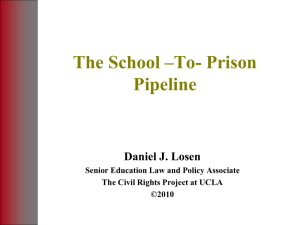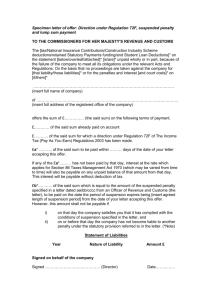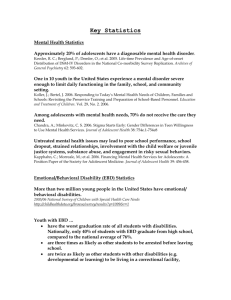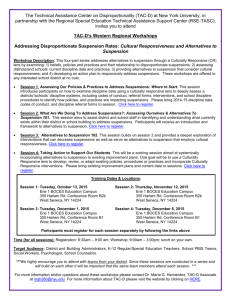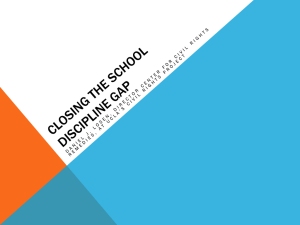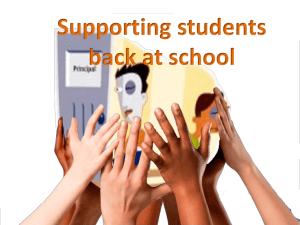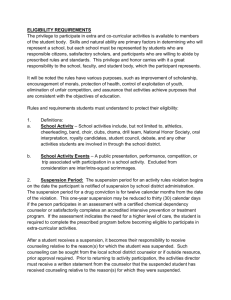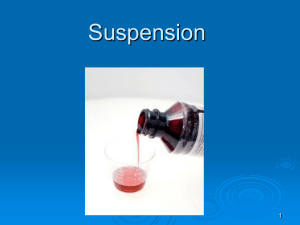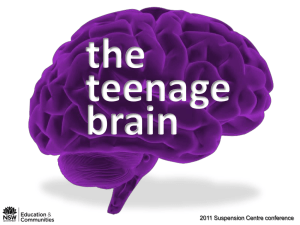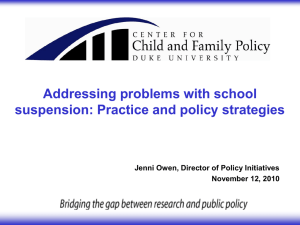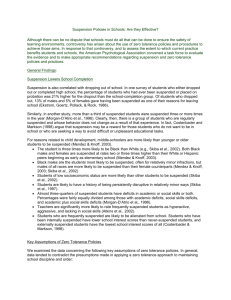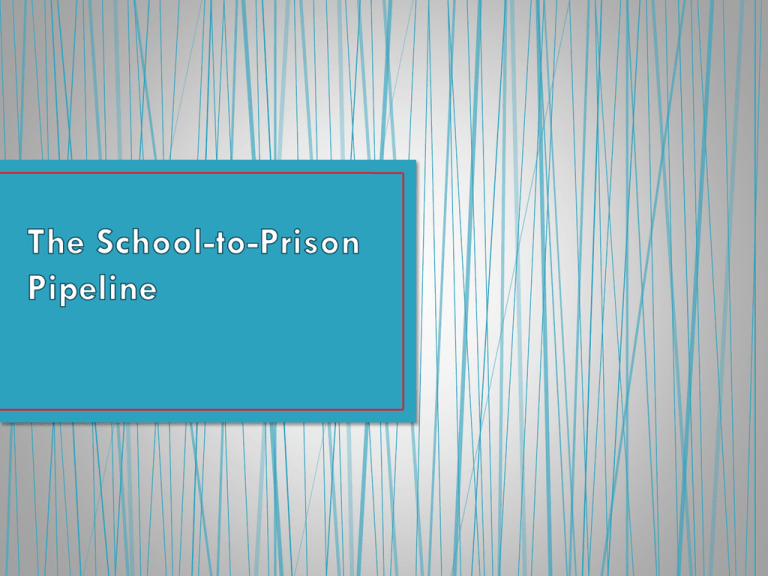
• A system of laws,
policies, and practices
that pushes students out
of schools and into the
juvenile and criminal
systems
• An over-reliance on school
suspension to manage
behavior
• A willingness to view
adolescent misbehavior as
criminal activity
• Short-term suspension in NC schools,
by year
• Long-term suspensions in NC
schools, by year
• 2012-13
• 750,000 school days lost to
suspension from school
• 248,000 short-term
suspensions (1-10 days)
• 1,423 long-term suspensions
(more than 10 days)
• 37 permanent expulsions
• Overall rate:
•1 in 11 students
suspended
•In high school,
1 in 8
• Students more likely than others to be in the
school-to-prison pipeline:
• Start behind on social and academic skills due to
limited enrichment from birth – age 5
• Have continued poor academic achievement, often
having been retained in at least one grade
• Have been raised in a low-income, single-parent
household
• Have no or limited family history of post-secondary
education
percentage of black
students suspended
5%
17%
83%
percentage of white
students suspended
suspended
suspended
not
suspended
not
suspended
95%
General population
12%
88%
Students
with
disabilities
Students
without
disabilities
Suspended students
26%
74%
Students
with
disabilities
Students
without
disabilities
• As an affected student misses more school and feels the sting of
rejection and “unfairness,” misbehavior gets worse, not better
• Student may begin skipping school to avoid negative
interactions and embarrassment of poor academic achievement
• Student begins engaging in unlawful community behavior, such
as vandalism, theft, etc.
• Student may connect with gangs or other excluded students
• Student gets arrested and ultimately incarcerated
• School resource officers
(SROs) are law
enforcement officers
permanently assigned to
work in schools
• Nearly all high schools in the
state have at least one SRO
• Two-thirds of middle schools
have at least one SRO
• 20 percent of elementary
schools have an SRO
• Steady increase in the number of
SROs in schools
• Can create an atmosphere of
hostility and control rather than
safety and support
• More SROs result in more schoolrelated behaviors becoming
juvenile and criminal offenses
• 46% of all juvenile complaints are the result of school-based
offenses (students under age 16).
• Top three delinquent offenses:
• Simple assault
• Misdemeanor larceny
• Disorderly conduct at school
• No data are kept on how many 16 and 17-year-olds have
criminal charges for school-based offenses, but anecdotally, we
know it is a high number
• At least one in three
juveniles arrested has a
disability
• Students with disabilities
are three times more likely
to be arrested before
leaving high school than
the general population.*
• *Source: The Hechinger Report, Oct. 26, 2014
•
“ Pipeline to Prison: Special Education Too
Often Leads to Jail for Thousands of American
Children”
• Students with emotional
disabilities tend to be
more impulsive, less able
to problem-solve, and
less able to manage
emotions, resulting in
aggressive or other
disorderly behaviors
• For individuals students, school
suspension is linked to:
• Poor academic achievement, both
short term & long term
• Lasting disconnection between
suspended student and school
• Increased truancy and future
misbehavior
• Increased risk of later incarceration
• Difficult to find evidence that
suspension reduces misbehavior;
higher rates of suspension do not
correlate with safer, more orderly
schools
• Commitment to Change
• Prevention
• Intervention
• Alternatives
6,000
5,000
4,000
3,000
2,000
1,000
0
• 2011 – N.C. General Assembly revised the state law
on school discipline
• Left discipline primarily in the discretion of local school
boards, but –
• Made zero tolerance approach unlawful
• Requires the consider mitigating circumstances
• Requires that long-term suspensions be restricted to serious
violations of board policy
• Encourages use of alternatives to suspension
• Spelled out “due process” procedures
• School boards can limit the authority of principals and the
superintendent to impose suspensions in certain circumstances
• Examples –
• No suspension from elementary school
• No suspension on first offense
• No suspension until certain interventions are tried
• No suspension for longer than 30 days
• No suspension for certain offenses (i.e., disrespect, disobedience)
• No court referrals for most school offenses
• Engage students in
academics
• Support & train staff in
behavior management,
cultural competency
• Implement Positive Behavioral
Interventions and Support
• Reduce class size
• Make social, emotional, and
behavioral education a
regular part of school
• Engage parents
•
•
•
•
Student support teams
Mentoring & counseling
Social work services
Substance abuse
intervention
• Personal Education
Plans
• Effective IEPs for
students with disabilities
•
•
•
•
•
Mediation
Restorative justice
Restitution
Community service
Effective alternative
schools
• Effective in-school
alternative learning
centers
• North Carolina is the only state
in the United States that always
treats 16 and 17 year olds as
adults in the criminal justice
system
• Deprives 16 & 17 year olds of the
“rehabilitative” aspects of juvenile
system
• Deprives 16 & 17 year olds of the
confidentiality of the juvenile
system (giving them public criminal
records)
• Results in incarceration in adult jails
• Youth Justice North Carolina
-- http://youthjusticenc.org/
• Watch the documentary:
“North Carolina’s School to
Prison Pipeline”
• NC Child -- Raise the Age
http://www.ncchild.org/whatchildren-need/juvenile-justice

